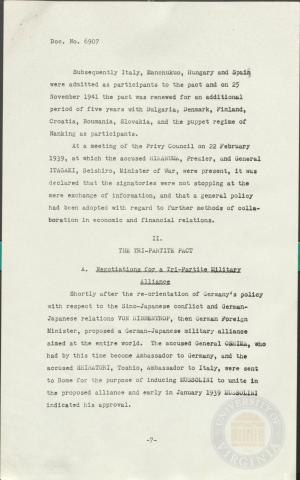
Page 7
| Parent | Doc. 6907 - Collaboration Between Japan, Germany and Italy, Volume 1 - Opening Statement |
|---|---|
| Date | |
| Language | English |
| Collection | Tavenner Papers & IMTFE Official Records |
| Box | Box 15 |
| Folder | Japan, Germany, Italy Collaboration Vol 1 |
| Repository | University of Virginia Law Library |
Doc. No. 6907
Subsequently Italy, Manchukuo, Hungary and Spain were admitted as participants to the pact and on 25 November 194-1 the pact was renewed for an additional period of five years with Bulgaria, Denmark, Finland, Croatia, Houmania, Slovakia, and the puppet regime of Nanking as participants*
At a meeting of the Privy Council on 22 February 1939, at which the accused HIRANUMA, Premier, and General ITAGAKI, Seishiro, Minister of War, were present, it was declared that the signatories were not stopping at the mere exchange of information, and that a general policy had been adopted with regard to further methods of colla* boratlon in economic and financial relations*
II.
THE TRI-PaRTITE PACT
A. ffcsgUatjgns for a Tri-Par,titg miuary
Alliance
Shortly after the re-orientation of Germany's policy with respect to the Slno-Japanese conflict and German- Japanese relations VON RIBBENTROP, then German foreign Minister, proposed a German-Japanese military alliance aimed at the entire world. The accused General OStilMA, who had by this time become Ambassador to Germany, and the accused SHIRATORI, Toshlo, Ambassador to Italy, were sent to Rome for the purpose of inducing MUSSOLINI to unite in the proposed alliance and early in January 1939 MlioSOLIttl Indicated his approval.
